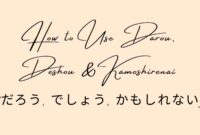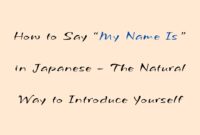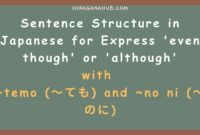Stating ‘A is better than B’ in Japanese with (yori – houga)
This article will discuss how to express comparisons in Japanese, specifically
how to say “A is better than B.” We use the sentence structure ~yori ~hou ga
to express this comparison in Japanese. By understanding this pattern, you can
express preferences or choices easily.
Let’s get started with learning together!
Sentence Structure ~ yori ~ hou ga
A ~より B ~ほうが
A ~yori B ~hou ga
This sentence structure compares two things and shows that B is better or more desirable than A.
It is beneficial in everyday conversations.

Meaning of ~ yori ~ hou ga
Then A, B is more ~
With this structure, we compare two things and state that B is better than A in some aspects.
Explanation of ~ yori ~ hou ga
The structure ~ yori ~ hou gais used to compare two things, whether it’s two activities, two
traits, two objects, or two states.
YORI (より) means “then,” which indicates we are comparing two
thingsHOU GA~ (方が~) suggests the second choice is better.
The types of words used in this structure can be verbs, adjectives, or
nouns. However, verbs or nouns are more commonly used.
For i-adjectives, you can use the adjective directly without adding anything. However, when
using na-adjectives, the second adjective must be followed by na. For nouns, you must add the particle no (の) before hou ga.
Formula ~ yori ~ hou ga
A + より + B + の + 方が + adjective/verb
Example:
A より B の 方が いい (B is better than A)
5. Example Sentences ~ yori ~ hou ga
Example 1:
ジョギングより、サイクリングのほうが楽しいです。
ジョギングより、サイクリングのほうがたのしいです
Jogingu yori, saikuringu no hou ga tanoshii desu.
Biking is more fun than jogging.
Example 2:
図書館で勉強するより、カフェで勉強するほうが集中できます。
としょかんでべんきょうするより、カフェでべんきょうするほうがしゅうちゅうできます。
Toshokan de benkyou suru yori, kafe de benkyou suru hou ga shuuchuu
dekimasu.
Studying at a cafe is easier to focus on than at the library.
Example 3:
この町より、隣の町のほうが静かです。
このまちより、となりのまちのほうがしずかです。
Kono machi yori, tonari no machi no hou ga shizuka desu.
The town next door is quieter than this town.
Example 4:
オーストラリアの天気より、ニュージーランドの天気のほうが涼しいです。
オーストラリアのてんきより、ニュージーランドのてんきのほうがすずしいです。
Oosutoraria no tenki yori, Nyuu Jiirando no tenki no hou ga suzushii
desu.
The weather in New Zealand is cooler than in Australia.
Example 5:
自転車より、バスのほうが速いです。
じてんしゃより、バスのほうがはやいです。
Jitensha yori, basu no hou ga hayai desu.
The bus is faster than the bike.
Example 6:
ビーチより、山のほうが好きです。
ビーチより、やまのほうがすきです。
Biichi yori, yama no hou ga suki desu.
I prefer the mountains
over the beach.
Example 7:
レストランで食べるより、家で料理するほうが楽です。
レストランでたべるより、いえでりょうりするほうがらくです。
Resutoran de taberu yori, ie de ryouri suru hou ga raku desu.
Cooking at home is easier than eating at a restaurant.
Vocabulary List
Here is a vocabulary list used in the example sentences to help you understand
and use this pattern in daily conversations.
| Kanji | Hiragana | Romaji | Meaning |
|---|---|---|---|
| ジョギング | じょぎんぐ | jogingu | jogging |
| サイクリング | さいくりんぐ | saikuringu | biking |
| 図書館 | としょかん | toshokan | library |
| 勉強 | べんきょう | benkyou | studying |
| カフェ | かふぇ | kafe | cafe |
| 集中 | しゅうちゅう | shuuchuu | focus |
| 町 | まち | machi | town |
| 隣 | となり | tonari | next door |
| 静か | しずか | shizuka | quiet |
| 天気 | てんき | tenki | weather |
| 涼しい | すずしい | suzushii | cool |
| バス | ばす | basu | bus |
| 自転車 | じてんしゃ | jitensha | bicycle |
| ビーチ | びーち | biichi | beach |
| 山 | やま | yama | mountain |
| レストラン | れすとらん | resutoran | restaurant |
| 家 | いえ | ie | home |
| 料理 | りょうり | ryouri | cooking |
The sentence pattern ~ yori ~ hou ga is a simple and
effective way to compare two things and express preferences in Japanese. By
using the particle yori for “than” and
hou ga to indicate that the second option is better, you can
easily talk about what you like or dislike in various situations.
Try practising making sentences using this pattern in your daily
conversations! The more you practice, the more fluent your Japanese will
become. We hope this explanation is helpful and makes learning Japanese easier
for you!
See you in the next article!


